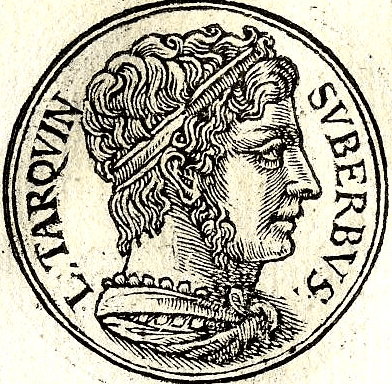This is the first part of a Latin translation exercise in which I attempt to translate Livy's account of the Rape of Lucretia into English. The narrative is found in the 57th chapter of the first book of The History of Rome, Ab Urbe Condita Libri.
I am by no means a Latin expert. I studied basic Latin many years ago while doing my Masters degree in English Renaissance Literature.
The Rape of Lucretia
The story of the rape of Lucretia is one of the "founding myths" of the Roman republic. Livy's is the earliest written account we have of the story. Later writers such as Ovid, Augustine, Chaucer, Machiavelli, and Shakespeare also tell or discuss the story in various ways.

Tarquin the Proud
A brief outline of the story might go like this: In the time of King Tarquin the Proud (Tarquinius Superbus), the Roman army was besieging Ardea, a nearby town. During a lull in the fighting the princes hold a party and get drunk. They begin to argue about whose wife is the best. They decide to gallop back to Rome to see what their wives are up to as a way to decide which husband is the "winner".
When they get back to Rome they find that all the wives are partying except for Collatine's wife, Lucretia, who is at home at her spinning wheel.
Sextus Tarquinius, son of King Tarquin, seeing the chaste and beautiful Lucretia lusts after her. The princes return to the siege of Ardea, but Sextus Tarquinius secretly returns to Rome and visits Lucretia at Collatine's house. Lucretia treats him as an honoured guest, dines him and gives him a room for the night. During the night Sextus takes his sword and enters Lucretia's bedroom and rapes her before making his escape.
The next morning Lucretia summons her father and her husband, tells them what has happened, implores them to take revenge, and kills herself. They display her body to the Roman people, who, already resentful of the tyrannous Tarquin, revolt, expel the Tarquins and establish the Roman Republic.
So here goes...
Chapter 1, Section 57.1-2
The story begins with a complex 55 word sentence that sets the scene for the action...
Ardeam Rutuli habebant, gens, ut in ea regione atque in ea aetate, diuitiis praepollens;
The Rutuli, who inhabited Ardea, was a tribe which, in those regions and in those times, was exceedingly wealthy;
praepolleo: to surpass in power
eaque ipsa causa belli fuit, quod rex Romanus cum ipse ditari, exhaustus magnificentia publicorum operum, tum praeda delenire popularium animos studebat,
and that was the cause of the war, because the king of the Romans, having exhausted his own wealth on the magnificence of his public works, sought to enrich himself and mollify the hearts of the people with booty,
ditare: to enrich
praeter aliam superbiam regno infestos etiam quod se in fabrorum ministeriis ac seruili tam diu habitos opere ab rege indignabantur.
for, in addition to being hostile to the tyranny of his reign, they were indignant that they had been put to work for so long by the king as labourers and slaves.
That last part was very tough to unpick and translate. Feel free to suggest any corrections in the comments if Latin is your thing!
Resources:
Livy, Ab Urbe Condita Libri http://www.perseus.tufts.edu/hopper/text?doc=Perseus%3Atext%3A1999.02.0160%3Abook%3D1%3Achapter%3D57
Rape of Lucrece Quizlet! https://quizlet.com/gb/494268371/livy-chapter-57-flash-cards/
Picture source: https://en.wikipedia.org/wiki/Lucius_Tarquinius_Superbus
David Hurley
#InspiredFocus
https://davidhurleyinjapan.com
Hi @hirohurl Sextus Tarquinius, son of King Tarquin, was an evil man and caused Lucrece to kill herself. This is Shakespeare correct, David? Is this a true story? Thank you. Barb :) !BBH !CTP
Hi Barb,
This translation project is based on the Roman historian Titus Livius' account of the episode in his history of the Roman people, titled, "From the Founding of the City" (of Rome) - "Ab Urbe Condita," in Latin. Shakespeare read Livy as well as the Roman poet Ovid (who also wrote about the Rape of Lucretia), and quite possibly other sources as well, for his poem, The Rape of Lucrece.
As to whether it is a true story or not, it is probably closer to legend than to historical fact, a bit like our King Arthur. It's the story the Romans told to explain how Rome became a Republic.
Here's some info about Livy: https://en.wikipedia.org/wiki/Livy
!CTP
!ALIVE
@adcreatordesign! You Are Alive so I just staked 0.1 $ALIVE to your account on behalf of @hirohurl. (2/10)
The tip has been paid for by the We Are Alive Tribe through the earnings on @alive.chat, feel free to swing by our daily chat any time you want.

Hello, David. Thank you for your explanation. Ok I see and understand. It would be so fascinating if we could find out if they were true or not. That would be exciting if archeologists could ever find artifacts and writings to prove them as truths or not. Have a great week ahead. !BBH !CTP